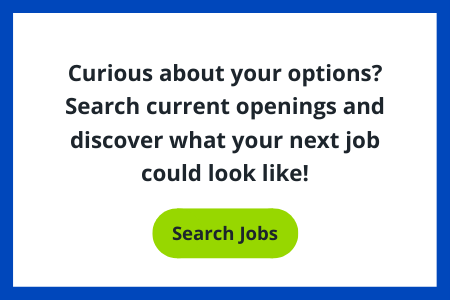When you first start a new job, there is so much to learn! But before you know it, you’ve been there one year, two years, three years— and at some point you start to feel anxious that you need to be doing something to progress your career. Do you need a new job? Are you being paid enough? Do you need to “put in the time” and pay your dues? Should you just be grateful to be employed? Here are four questions you can ask yourself to figure out if it’s time to start looking for a new job:
Is your job meeting your needs?
Almost everyone works to make money, and that’s okay! You have bills to pay, retirement to plan for, and health needs to take care of. Whether your raises are not keeping up with inflation or your workplace doesn’t have good parental leave policies, there are many reasons why a job that used to meet your needs might not anymore. If you feel like you can’t find higher pay or better benefits elsewhere, you might be surprised– the vast majority of the time, you can!
Are you happy in your current job?
How do you feel on Sundays when you think about going back to work the next day? Panic attacks, bouts of crying, and general existential dread are signs that your job is not good for you. They are signs of mental and emotional pain. You do not need to get over it or learn to live with it, you need a new job.
Are you on the right path for your career goal?
It’s okay if you don’t have a career goal. Most people don’t, which fuels the anxiety that they are not making career progress (you can’t progress towards something if you don't know what it is). Check out our blog on How to Set Your Career Goals to learn more. But, if you have a career goal, ask yourself if your current job will help you reach it. If not, you may want to find a new job.
Are you gaining new skills and experiences regularly at work?
New skills and new experiences make you a more competitive candidate when you search. The more skills you have, the more options you have. In a professional environment, once every three to six months is a good cadence for taking on a new project, developing a new skill or taking an existing skill to the next level, or accomplishing something significant. If your current job does not provide any of those opportunities (be sure to explicitly ask your manager for them) and you have to do all of your learning and professional development outside of work, you need a new job.
People get hung up on time. They wonder: “What if I’ve been in my job for too long?” or “Don’t I have to stay in my job for at least two years?” Time is a poor proxy for other more important things in our careers. If you are on the right path for your career goal, learning new things, and happy, stay put! Otherwise, you need a new job sometime in the future. The timeline for finding a new job depends on many factors in your life, but you can start taking steps now, so you’ll be ready for your search when it’s time.
This article or portions of this article was written by Karissa Justice and originally appeared on Work Can Be Better.



